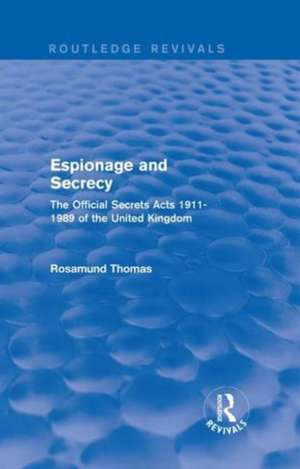Espionage and Secrecy (Routledge Revivals): The Official Secrets Acts 1911-1989 of the United Kingdom: Routledge Revivals
Autor Rosamund Thomasen Limba Engleză Hardback – 23 mai 2016
Din seria Routledge Revivals
- 9%
 Preț: 801.69 lei
Preț: 801.69 lei - 8%
 Preț: 432.15 lei
Preț: 432.15 lei -
 Preț: 153.81 lei
Preț: 153.81 lei -
 Preț: 230.80 lei
Preț: 230.80 lei -
 Preț: 294.72 lei
Preț: 294.72 lei -
 Preț: 258.72 lei
Preț: 258.72 lei - 9%
 Preț: 764.34 lei
Preț: 764.34 lei - 9%
 Preț: 903.41 lei
Preț: 903.41 lei -
 Preț: 296.10 lei
Preț: 296.10 lei -
 Preț: 342.36 lei
Preț: 342.36 lei - 9%
 Preț: 606.35 lei
Preț: 606.35 lei -
 Preț: 317.54 lei
Preț: 317.54 lei - 9%
 Preț: 764.28 lei
Preț: 764.28 lei -
 Preț: 257.00 lei
Preț: 257.00 lei -
 Preț: 238.40 lei
Preț: 238.40 lei -
 Preț: 259.47 lei
Preț: 259.47 lei - 9%
 Preț: 903.80 lei
Preț: 903.80 lei -
 Preț: 326.26 lei
Preț: 326.26 lei -
 Preț: 258.66 lei
Preț: 258.66 lei -
 Preț: 294.97 lei
Preț: 294.97 lei -
 Preț: 308.89 lei
Preț: 308.89 lei -
 Preț: 199.85 lei
Preț: 199.85 lei -
 Preț: 347.49 lei
Preț: 347.49 lei -
 Preț: 295.04 lei
Preț: 295.04 lei -
 Preț: 389.39 lei
Preț: 389.39 lei -
 Preț: 257.00 lei
Preț: 257.00 lei -
 Preț: 343.21 lei
Preț: 343.21 lei - 9%
 Preț: 640.90 lei
Preț: 640.90 lei - 9%
 Preț: 619.48 lei
Preț: 619.48 lei -
 Preț: 228.88 lei
Preț: 228.88 lei -
 Preț: 257.67 lei
Preț: 257.67 lei -
 Preț: 245.10 lei
Preț: 245.10 lei -
 Preț: 258.52 lei
Preț: 258.52 lei -
 Preț: 258.72 lei
Preț: 258.72 lei -
 Preț: 368.93 lei
Preț: 368.93 lei -
 Preț: 246.37 lei
Preț: 246.37 lei - 9%
 Preț: 832.07 lei
Preț: 832.07 lei -
 Preț: 258.66 lei
Preț: 258.66 lei -
 Preț: 286.98 lei
Preț: 286.98 lei - 18%
 Preț: 695.85 lei
Preț: 695.85 lei - 9%
 Preț: 934.94 lei
Preț: 934.94 lei - 5%
 Preț: 231.22 lei
Preț: 231.22 lei -
 Preț: 267.15 lei
Preț: 267.15 lei -
 Preț: 200.66 lei
Preț: 200.66 lei - 9%
 Preț: 638.61 lei
Preț: 638.61 lei -
 Preț: 259.68 lei
Preț: 259.68 lei - 9%
 Preț: 1038.45 lei
Preț: 1038.45 lei -
 Preț: 389.43 lei
Preț: 389.43 lei -
 Preț: 302.13 lei
Preț: 302.13 lei -
 Preț: 302.25 lei
Preț: 302.25 lei
Preț: 819.90 lei
Preț vechi: 1140.45 lei
-28% Nou
Puncte Express: 1230
Preț estimativ în valută:
156.88€ • 164.24$ • 129.81£
156.88€ • 164.24$ • 129.81£
Carte tipărită la comandă
Livrare economică 07-21 aprilie
Preluare comenzi: 021 569.72.76
Specificații
ISBN-13: 9781138686830
ISBN-10: 1138686832
Pagini: 324
Ilustrații: 8
Dimensiuni: 156 x 234 mm
Greutate: 0.45 kg
Ediția:1
Editura: Taylor & Francis
Colecția Routledge
Seria Routledge Revivals
Locul publicării:Oxford, United Kingdom
ISBN-10: 1138686832
Pagini: 324
Ilustrații: 8
Dimensiuni: 156 x 234 mm
Greutate: 0.45 kg
Ediția:1
Editura: Taylor & Francis
Colecția Routledge
Seria Routledge Revivals
Locul publicării:Oxford, United Kingdom
Cuprins
Illustrations; Foreword by John C. Smith C.B.E., Q.C., LL.D., F.B.A.; Preface; Acknowledgmeents; 1 History of the Official Secrets Acts 1911-1989 of the United Kingdom; 1.1 The Official Secrets Act 1911 1.2 The Amending Act of 1920 (that is, the Official Secrets Act 1920) 1.3 The Official Secrets Acts of 1939 and 1989; 2 Espionage and related offences: More recent analyses of section 1 of the Official Secrets Act 1911 (as amended); 2.1 Definition of espionage and related offences in section 1 2.2 Definition of ‘purpose prejudicial to the safety or interests of the State 2.3 Definition of mens rea in relation to section 1 2.4 Definition of ‘useful to the enemy’; 3 More recent analyses of the Official secrets Acts 1911-1989; 3.1 Definition of the power to exclude the public from court proceeding in Official Secrets cases 3.2 Definition of an ‘act of preparatory to the commission of an offence’ under the Official Secrets Act 3.3 Definition of ‘prohibited place’ in the Official Secrets Acts; 4 The consent of the Attorney-General to prosecutions under the Official Secrets Acts (with examples of section 1 offences); 4.1 The role and powers of the Attorney-General and other Law Officers of the Crown 4.2 The consent (that is, fiat) of the Attorney-General to prosecutions under the Official Secrets Acts (with examples of section 1 offences) Conclusions 4.3.1 General conclusions about the role and powers of the Attorney-General 4.3.2 Conclusions about the consent of the Attorney-General to prosecutions under the Official Secrets Acts; 5 Espionage and related offences: Problems of evidence in connection with Section 1 cases; 5.1 The law of evidence in criminal proceedings generally 5.2 Sources of, and problems regarding, evidence in espionage and related cases under section 1 of the Official Secrets Act 1911 (as amended) 5.2.1 Sources of evidence in espionage and related cases under section 1 of the Official Secrets Act 1911 5.2.2 Problems regarding evidence in connection with espionage and related cases under section 1 of the Official Secrets Act 1911 5.3 Conclusions 5.3.1 The ‘Cyprus Eight’ case and judicial evidence 5.3.2 General conclusions about the law of evidence in espionage cases; 6 Espionage and secrecy today; 6.1 The Official Secrets Act 1989 of the United Kingdom and the Security Service Act 1989 6.1.1 The Official Secrets Act 1989 6.1.2 The Security Service Act 1989 6.2 General conclusions: espionage and secrecy today; Author’s postscript; APPENDICES 1 The basic court system in England and Wales 2 Section 1 of the Official Secrets Act 1911, as amended in 1920 3 Section 2 of the Official Secrets Act 1911, as amended in 1920 (now repealed) 4 The Official Secrets Act 1989 which replaced section 2 of the 1911 Act 5 The Security Service Act 1989; List of Abbreviations; List of Cases; List of Statutes; List of Statutory Instruments; Bibliography; Index
Recenzii
Rosamund Thomas’s book is a trenchant legislative history of the official secrets acts from 1911, a careful legal analysis and an incisive commentary on criminal cases in the UK and USA. It wrestles with prosecutions of releases of information treated as espionage. This book extended the masterwork of the late David G.T. Williams, and is the finest work on the subject.
Jeremy Lewis,
Huntingdon College, USA
Researcher (among other subjects) of official information policy in the US and UK since 1976.
Dr Rosamund Thomas… reveals an encyclopaedic knowledge of the cases and the literature. Her careful analysis of the cases against the background of the general principles of criminal law and evidence and her thoughtful commentary will be essential reading for all who are interested in the subject.
The late J. C. Smith, C.B.E., Q.C., LL.D., F.B.A., Emeritus Professor of Law, University of Nottingham (September 1990)
Jeremy Lewis,
Huntingdon College, USA
Researcher (among other subjects) of official information policy in the US and UK since 1976.
Dr Rosamund Thomas… reveals an encyclopaedic knowledge of the cases and the literature. Her careful analysis of the cases against the background of the general principles of criminal law and evidence and her thoughtful commentary will be essential reading for all who are interested in the subject.
The late J. C. Smith, C.B.E., Q.C., LL.D., F.B.A., Emeritus Professor of Law, University of Nottingham (September 1990)
Descriere
This prize-winning book, first published in 1991, provides a detailed legal account of the development of the UK Official Secrets Acts 1911-1989. In particular, the Espionage section (s.1) of this criminal law is analysed carefully, illustrated by leading cases of UK spies prosecuted under this section, particularly during the 1980’s — including MI5 officer Michael Bettaney and Geoffrey Prime who worked at GCHQ. The author also examines problems of evidence in espionage prosecutions, and the consent of the Attorney-General in cases under the Official Secrets Acts. This book remains the definitive treatise on the UK Official Secrets Acts, especially concerning the espionage provisions.















